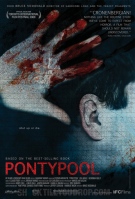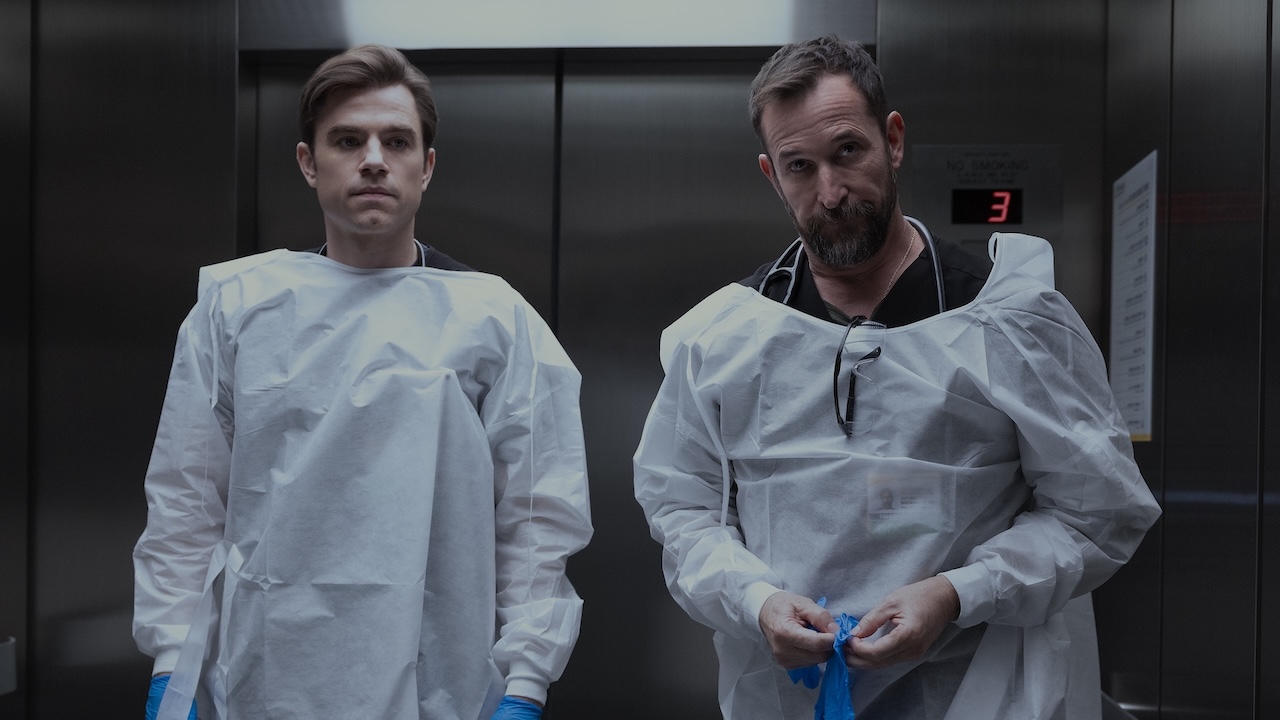There are a lot of options for making a psychological horror film on a budget. You can go the early Sam Raimi route, embrace the cheese and use the bad special effects as best you can. Or you can choose to let the audience scare themselves, setting up the context of the horrifying event and let imaginations play out from there. In Pontypool, a sublimely creepy horror exercise from Canadian director Bruce McDonald, the zombie-esque hordes are barely seen and only seldom heard, but their presence is felt throughout the claustrophobic and highly effective film.
Originally adapted as a radio drama from the book Pontypool Changes Everything by Tony Burgess (who also wrote the screenplay), Pontypool maintains its radio-bound roots. The gruff and grizzled Stephen McHattie is quite believable as radio shock jock Grant Mazzy, who has for unknown reasons landed in the frigid backwater Pontypool, where his produce Sidney (Lisa Houle) constantly asks him to tone down his button-pushing schtick. Sidney and Grant, along with their technician Laurel Ann (Georgina Reilly), are at work on a cold February morning when they get word of some strange activity at the center of town. A horde of people, many of them repeating the same word or even imitating the sound of a windshield wiper, have crowded into the office of a local doctor, and now seem to be spreading, attacking and even eating any person who gets in their way.
The cause of the disease, and its ramifications, is a mystery that unfolds very slowly throughout the film, as Sidney, Laurel Ann and Grant slowly panic over the news but still must go through their usual routine. An live interview with a pushy BBC reporter is preceded by the local singing group "Lawrence and the Arabians," and Sidney frets over having dead air even when Laurel Ann starts showing symptoms of the disease. This all unfolds at a pace that's a stark contrast to the usual lickety-split thrillers; McDonald is working at a meditative, slowly ratcheting pace, giving us plenty of time to identify with the lead characters' confusion and letting the whole thing happen practically in real time.
McHattie and Houle bear an enormous responsibility, telling nearly the entire story in reaction shots and conversations that all come back to the central question of "What the hell is happening?" There's a little subplot about Grant and Sidney's relationship growing as each of them steps up to the challenge of surviving this nightmare, but mostly the two of them just work well as a team (McHattie and Houle are married in real life, which might explain some of it). Popping up late in the film is Hrant Alianak as the besieged doctor from the beginning, offering some comic relief and some explanation, which at that point in the film feels much needed.
The uncertainty and tension that McDonald has worked so hard to create fizzles in the film's third act; the zombie disease is given a frustrating explanation, and when Grant and Sidney make a shot at being heroes near the end, it's unclear what they're trying to do or even why they think they can fix it. The power of the radio, the faceless voice giving commands, is flirted with but never fully realized, and some tangential relationship to real-life events-- Laurel Ann is an Afghanistan war veteran-- is abandoned with little fanfare.. Despite all the success that this unconventional zombie movie has when tinkering with your brain early on, what it needed near the end was some more traditional storytelling, some way to wrap up the narrative in a satisfying way.
Still, Pontypool succeeds as an exercise pointing to a new way of doing horror for an audience that knows all the mechanics of the zombie movie and now simply needs a new reason to care. Effective and spooky and definitely smarter than your average studio fare, Pontypool is an off-the-wall little offering that rewards viewers looking for something different.
Your Daily Blend of Entertainment News
Staff Writer at CinemaBlend


